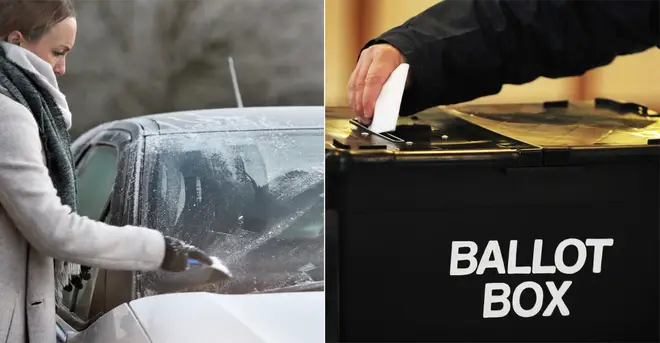
Tom Swarbrick 4pm - 7pm
5 December 2019, 08:47

The UK faces a cold snap on the week of the general election with forecasters warning of snow for parts of the country on 12th December.
The country goes to the polls next week in the first winter election since 1974 and there are fears that inclement weather would have an impact on the turnout.
However, no election since the poll in February 1974 has had a higher percentage of people voting.
Regarding the weather, Dean Hall from the Met Office told LBC: "The weather is going to be very unsettled for the next couple of weeks.
"There is a high risk of ice and snow for northern England, Scotland and Northern Ireland, and these areas should all be snowy for the election.
"There is also a risk of ice and frozen fog across the UK next week."
Some dense #fog across southern and central parts this morning, as well as some frost.
— Met Office (@metoffice) December 5, 2019
Meanwhile rain pushing in across the northwest pic.twitter.com/cHz5daO2ue
Pollsters insisted that poor weather is unlikely to deter voters, with rain and snow only having "a small effect on turnout".
Ben Page from Ipsos MORI, said: "In terms of winter elections, we only really have February 1974 to go on. Then the weather was bad but the turnout (79 per cent) was high, and up on 1970.
"By contrast, for the Blair 1997 landslide, temperatures rose to the mid-20s, but turnout (71 per cent) was down on 1992.
"Other factors, such as the perceived importance and closeness of the election, are likely to play at least as big a part as the weather, and of course far more people tend to vote by post, where the weather is irrelevant."
Chris Curtis, political research manager at YouGov, added: "It might be getting extremely cold over the next week or so but it's unlikely that the weather is going to deter anyone going to the polls who wasn't already staying at home.
"Most of the evidence shows that weather actually has quite a small effect on turnout, and factors such as how close the election is perceived to be, and how different the parties' positions are, normally have more of an impact."